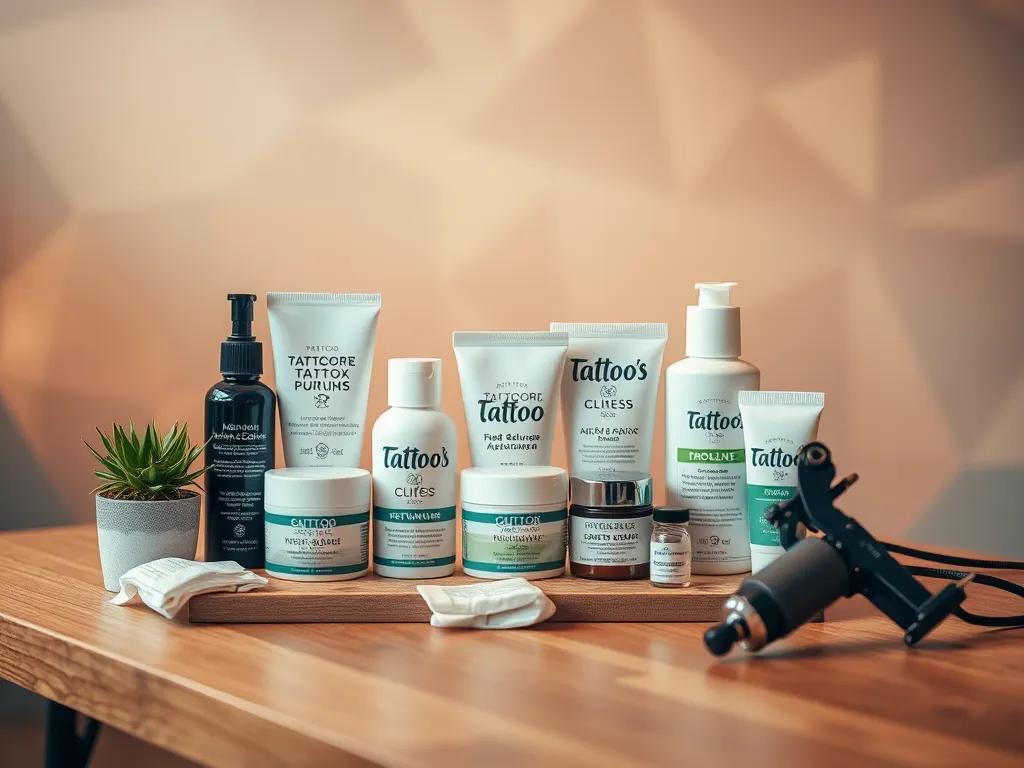Essential Tattoo Aftercare Practices: Tips for Perfect Healing

Tattoo Aftercare: Essential Tips for Optimal Healing and Longevity
Tattoo aftercare is a crucial aspect of ensuring that your new ink heals well and retains its vibrancy over time. Neglecting proper aftercare can lead to complications such as infection, fading, and uneven healing, which can ruin the artistry of your tattoo. Understanding the right steps to take in tattoo aftercare is essential for any tattoo enthusiast.
Proper adherence to Tattoo Aftercare practices can significantly enhance the longevity and vibrancy of your ink.
During the first few weeks after getting a tattoo, the skin undergoes significant healing changes, and the right tattoo aftercare techniques can aid in this process. This article will cover the key elements of aftercare, including cleaning, moisturizing, sun protection, and signs of infection to watch for. By following these tips, you can ensure your tattoo heals properly and remains a source of pride for years to come.
In addition to promoting healing, effective tattoo aftercare helps enhance the vibrancy of your new ink. The right practices can ensure that the colors stay bright and that the lines remain sharp. With the varying aftercare products available, it can be challenging to know what works best. This article aims to equip you with practical knowledge and recommendations to make informed decisions regarding tattoo aftercare.
Whether it's your first tattoo or a part of your body art journey, it's vital to understand the intricacies of tattoo aftercare. Each tattoo artist may have different recommendations based on their experience and the type of ink used, but adhering to high-quality general aftercare guidelines can provide consistent results. Make informed choices and treat your tattoo with the respect it deserves.
Now, let’s delve into the primary components of tattoo aftercare that will help you both in the immediate aftermath and in the long-term upkeep of your body art.
Tattoo Cleaning Techniques
When it comes to tattoo cleaning, the best practices involve gentle washing with mild soap and lukewarm water. Use your hands to avoid friction or scrubbing the area too harshly. Always pat it dry with a clean towel instead of rubbing it, and only clean the tattoo when necessary—typically once or twice a day during the initial healing period.
Recommended cleaning products for tattoo care include unscented, antibacterial soaps that won’t irritate your skin. Brands like Dial, Cetaphil, and Neutrogena offer excellent options that are gentle yet effective. Avoid products with fragrances or harsh chemicals, as these can harm the healing process.
Clean your tattoo after getting inked, and continue to do so twice a day for the first 1-2 weeks. After that period, you can reduce cleaning frequency to once a day or as needed if the area feels dirty or uncomfortable. Always listen to your body and adjust accordingly.
Moisturizing and Hydration
Staying hydrated is crucial for a tattoo's healing process. Proper hydration aids in skin repair and elasticity, which is vital as your tattoo heals. Drinking plenty of water helps your skin recover more efficiently after the trauma of inking.
The best moisturizers to use for tattoos are fragrance-free and specifically designed for sensitive skin. Products like Aquaphor, coconut oil, and tattoo-specific balms work well to keep your tattoo nourished and hydrated without irritating it.
To keep a tattoo moisturized without causing irritation, apply a thin layer of your chosen moisturizer 2-3 times a day. Ensure that your hands are clean before applying the moisturizer, and avoid over-applying, as this can lead to a clogged pore situation.
Sun Protection for Tattoos
Sun exposure can be particularly harmful to fresh tattoos, leading to fading, discoloration, and irritation. The UV rays can damage the healing skin and affect the tattoo ink, so protecting your new art from the sun is vital for preserving its integrity.
The best sunscreens for tattoo protection are those with a high SPF (30 or above) and broad-spectrum coverage. Look for formulas that are mineral-based, which can provide a physical barrier against sun damage. Brands like Neutrogena, Banana Boat, and Coppertone offer excellent options.
Protect your tattoo during outdoor activities by applying sunscreen generously at least 30 minutes before sun exposure. Wear loose-fitting clothing that covers the tattoo as much as possible, and try to stay in the shade during peak sun hours.
Signs of Infection to Watch For
Identifying infection symptoms in new tattoos can be pivotal for early intervention. Look for signs such as increased redness, swelling, a feeling of warmth around the area, and pus or liquid draining from the tattoo. If you notice any of these symptoms, it may indicate an infection developing.
When to seek medical advice for tattoo issues depends on the severity of your symptoms. If you experience persistent symptoms after following aftercare instructions or if the symptoms worsen, consult a healthcare professional immediately to address any infection or complications.
Prevention tips to avoid tattoo infection include keeping the tattoo clean and moisturized, avoiding touching it with dirty hands, and never scratching the area while it is healing. Be mindful about exposure to bodies of water such as pools, lakes, and hot tubs as these environments can harbor bacteria.
Long-term Tattoo Care
To maintain tattoo vibrancy over time, regularly apply sunscreen when exposed to the sun, as UV rays can significantly fade tattoo ink. Additionally, moisturizing your skin regularly helps keep the tattoo looking its best.
Regular moisturizing is vital for tattoos, regardless of their age. Using an unscented interlaced moisturizer keeps the skin supple and enhances the look of your tattoo, preventing the ink from appearing dull or clouded.
For older tattoos, touch-ups may be necessary to refresh the ink and maintain its appearance. Consult with a professional tattoo artist to determine the best approach for caring for your older tattoos, and ensure you continue following aftercare guidelines to protect their longevity.